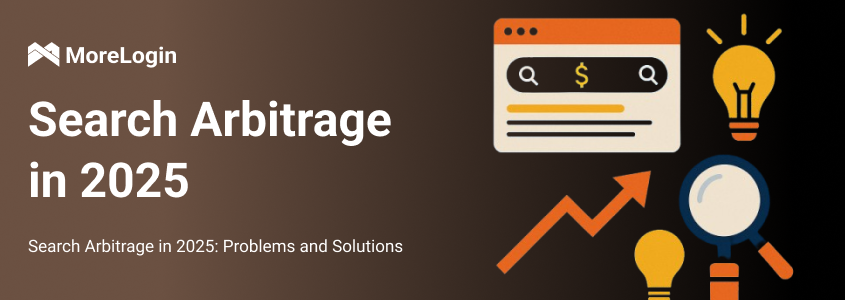
- Product

- Pricing
- Affiliate Program
- Use Cases
- Resource


At conferences like Affiliate World, all the attention goes to gambling, crypto, and nutra.
Search arbitrage remains in the shadows. But not because the niche isn’t working — it’s just not openly discussed. There's less hype here, but stable money and big players with million-dollar budgets.
Unlike CPA platforms, where you’re paid per lead or sale, Search Arbitrage is pay-per-click, which means less dependence on session outcomes. You’re not waiting for a registration or deposit — you get paid for the click itself.
Search Arbitrage is one of the oldest yet least talked-about ways to earn in digital advertising. Its core idea is simple: buy cheap traffic and sell it at a higher price by redirecting it to ads.
Unlike classic affiliate arbitrage where you're paid for leads or sales, here you earn per click. That fundamentally changes the strategy — you're not waiting for the user to convert; you profit the moment they click.
The concept works like this: the user clicks on an ad, lands on a page filled with thematic keywords or ad blocks, and then optionally clicks through to an advertiser's website. This intermediate step allows the arbitrageur to earn from each qualifying click, as long as it meets the partner program or feed provider's requirements.
The most common verticals in search arbitrage are:
Financial services
Healthcare
Insurance
Real estate
Jobs
These are categories where advertisers pay highly for relevant clicks and where organic traffic is lacking.
The model operates via feed providers — intermediaries between arbitrageurs and platforms like Google. Feed providers take a share of the ad budget and split revenue with publishers. These partnerships are usually closed and require experience, compliance, and adherence to advertising rules.
Search Arbitrage demands:
Precise keyword targeting
High-quality traffic
Careful compliance with partner rules
This is not a playground for clickbait or aggressive marketing — violations can result in account bans and frozen funds. But if done right, it's a stable and scalable business independent of conversions or retargeting chains.
Even with tighter platform controls in 2025, the niche remains highly attractive for teams playing the long game.
1. High Competition
Search queries in commercial categories are often overheated: big players with large budgets and automated strategies dominate the auctions. This drives up CPC and makes it hard to compete without advanced analytics and finely tuned campaigns.
2. Ad Platform Policies
Platforms like Google Ads and Yandex Direct constantly tighten rules around ad quality, landing page transparency, and the legitimacy of your business model. Many arbitrage tactics fall under restrictions or outright bans, especially if they violate authenticity or legal standards.
That’s why many arbitrageurs rely on anti-detect browsers like MoreLogin — allowing them to manage multiple accounts safely and reduce the risk of bans.

3. Instability and Short-Term Results
Search arbitrage rarely produces predictable long-term income.
Auctions shift
Offers burn out
Platforms change policies
Algorithms adapt
What worked a month ago might not work today. Arbitrageurs must stay adaptive, find new niches, learn quickly, and keep up with changes.
4. Trust with Partner Programs
Some affiliate networks delay payments, reduce payout rates, or ban accounts citing policy violations. Vetting offers, choosing reliable partners, and having legal safeguards are critical for a stable, transparent operation.
Interest-based targeting is inefficient — it's better to go broad with sharp creatives.
At Quick Leads Marketing, they’ve built a team of designers + AI bots that:
Analyze performance
Gather feedback from buyers
Generate the best creatives
Creative → Exact Product (e.g., dental implants)
Any deception = ban risk (Google audits via Ad Library and spy tools)
Creatives can last for months. Approaches vary:
Massive scale: 1000 creatives per week
Narrow focus: English-speaking audiences + precision keywords
Keywords: Must be manually defined and highly specific.
Example:
“solar panels near me in Florida” = 95% relevance
Auto-keywords like “home improvement” have poor margins and conversion rates.
Diversification Plan:
Work with 7+ feed providers
Prioritize the most reliable ones
Run multiple accounts per provider (e.g., 10 accounts at $100,000 each)
→ Lowers risk of bans
High-Risk Verticals:
Adult
Health
Insurance
Job offers
These offer high payouts — but come with a very high ban risk.
Geo & Seasonal Diversification:
Summer campaigns in Tier-3 countries (India, Pakistan, Bangladesh) scaled well due to low CPCs
But: Bot traffic from FB and chargebacks made them unprofitable
Success requires:
Talented analyst
SPY tools
Keyword Planner
Traffic no longer just lands on a page — it’s embedded in relevant content.
Users now hit a page with:
Useful text
Offer button
Google loves this format.
Revenue = click payout. Payouts can vary ($1.50 → $0.20), but every quality click pays.
Arbitrage in 2025 isn’t about hype — it’s for those who think long-term.
Success lies in compliance, smart diversification, quality creatives, and precise targeting.